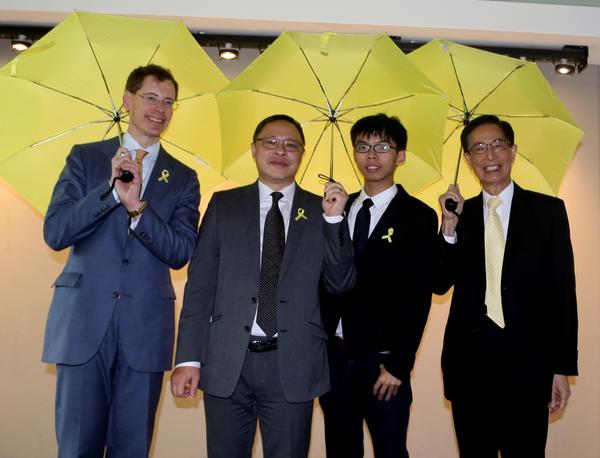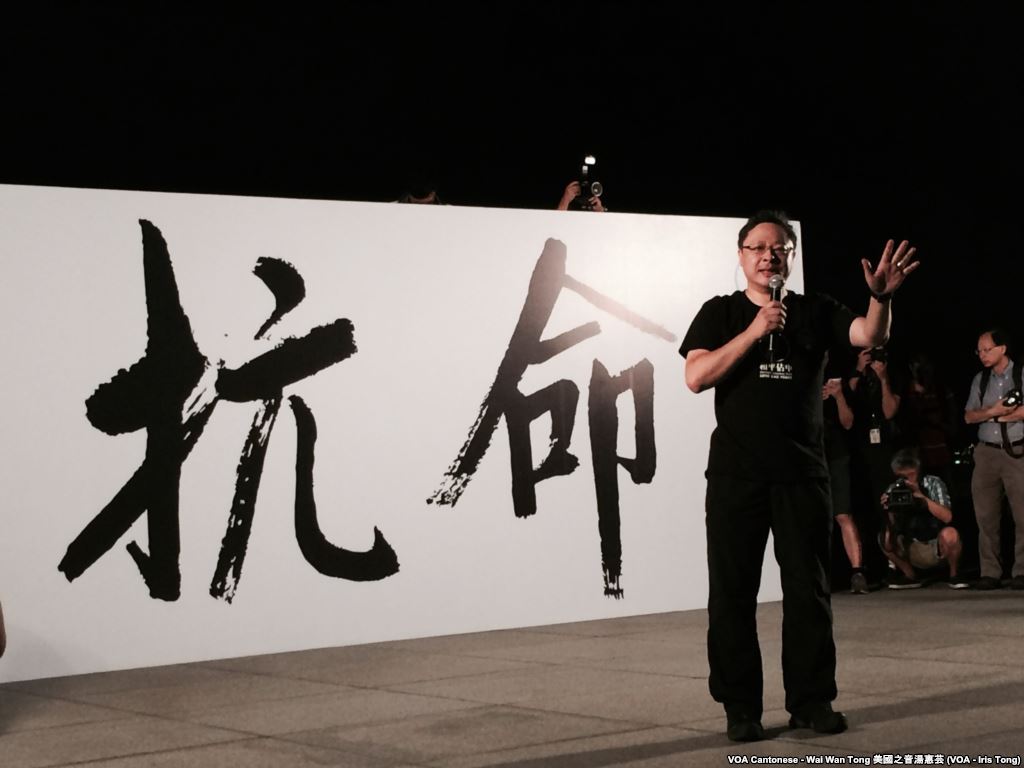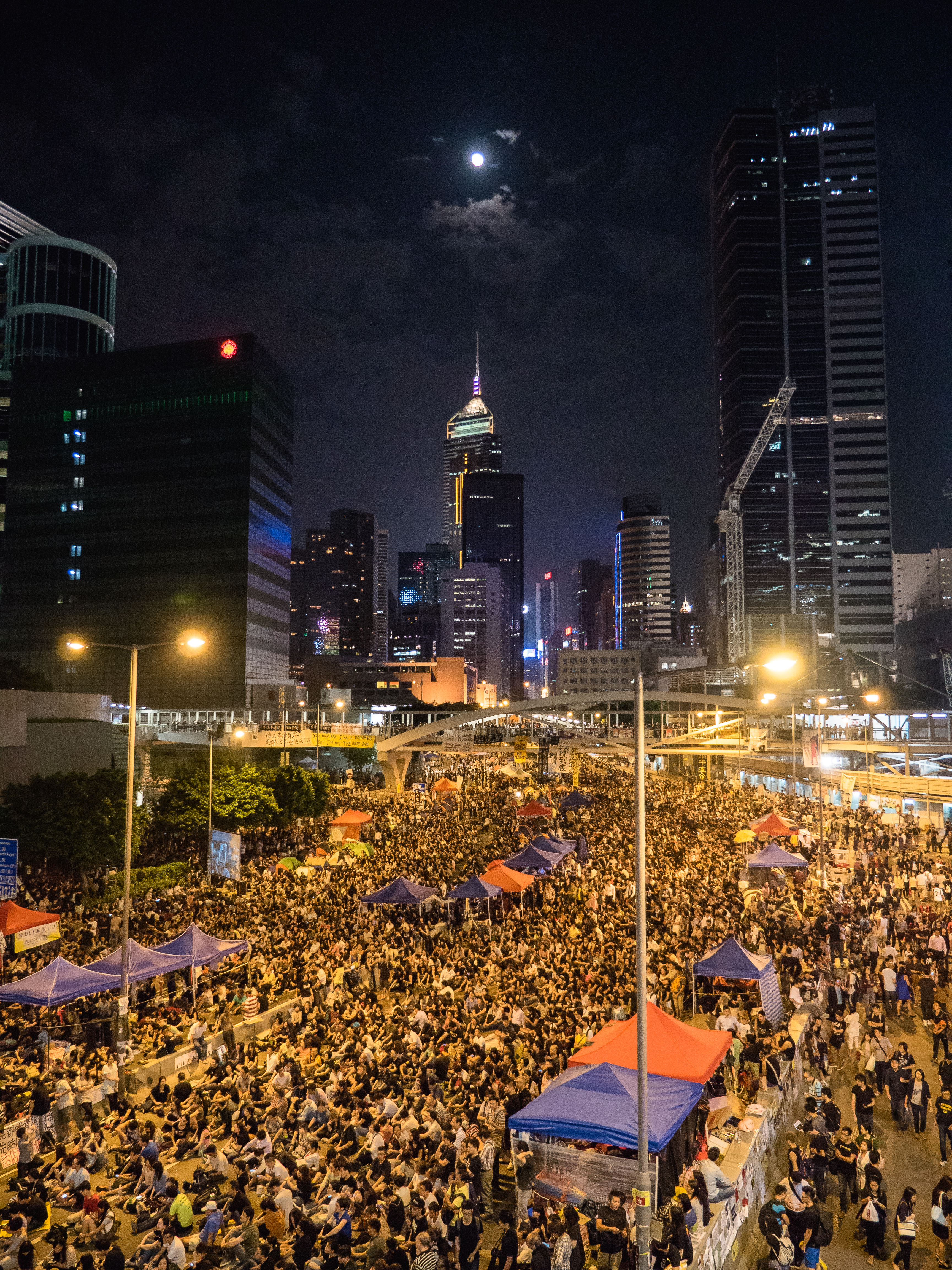A Critique Of Orientalist Interpretations
by Ting Jun
語言:
English
Photo Credit: alcuin lai/Flickr
MORE THAN a year since the Umbrella Movement took the world by storm, the debate over its significance remains shrouded in a cloud of propaganda, censorship, or worse, a distorted form of leftist Orientalism. With Beijing more or less blocking the development of a robust public debate over the Umbrella movement in Hong Kong and the mainland, what remains prominently visible are western accounts of the movement.
On the one hand, mainstream media has turned the protests and occupations into an ideological propaganda opportunity. By framing the issue as the good protesters versus the bad CCP, and silencing the vast complexity of the class, gender and race politics in Hong Kong, they reduce the significance of the Umbrella Movement to an endorsement of western liberalism. Furthermore, this media coverage works in coordination with the U.S. Department of State in its imperialist struggle against the CCP. For example, on the occasion of the one-year anniversary of the Umbrella Movement, Freedom House hosted Joshua Wong (黃之鋒), Benny Tai (戴耀廷) and Martin Lee (李柱銘). It was no coincidence that the ‘honoring’ of these newly manufactured ‘heroes’ coincided with Xi Jinping’s visit to Washington; it was an opportunistic publicity stunt.
Freedom House is a publicly funded NGO that receives almost all of its resources from the Federal Government, especially from the U.S. Agency for International Development (USAID), and the U.S. Department of State. USAID has been accused of carrying out politically motivated, interventionist activities in places like Cuba and Haiti, and Freedom House is no different: in 2004, it worked closely with U.S. state agencies to fund and support efforts to elect Viktor Yushchenko in Ukraine. Accused of electoral fraud, Yushchenko’s victory led to the Orange Revolution and massive social unrest. While there is no evidence that the U.S. has orchestrated, funded or otherwise meddled with any of the events in the Umbrella Movement, it does not take too much effort to see through the opportunism and political manipulation behind the mainstream coverage of the Umbrella Movement.
On the other side of the western political spectrum, there are radical leftists who have good reasons to feel discouraged by the rhetoric on liberal democracy. To them, the demands for universal suffrage, rule of law and western style governance seem naïve given the chronic failures of liberal democracy in the West. In an interview with the New Left Review, Joshua Wong (黃之鋒) was repeatedly pressed about the inefficacy and futility of electoral politics. This sentiment finds more explicit expression in other outlets as well; the faith that many protesters displayed for legal rights has been characterized as a form of ‘political incoherence and practical inexperience,’ the result of the suppression of the ‘communist left’ in Hong Kong after 1967.
 From left to right, Benny Tai, Joshua Wong, and Martin Lee at the Freedom House event which was held on September 24th. Photo credit: Freedom House
From left to right, Benny Tai, Joshua Wong, and Martin Lee at the Freedom House event which was held on September 24th. Photo credit: Freedom House
The argument for their frustration and dismissal of the Umbrella Movement resonates with any left-leaning radical residing in the West: Haven’t we gone through this already? Hasn’t history shown us that wealth inequity and labour precarity cannot be solved within the confines of parliamentary democracy; that the monopolization and expropriation of the means of production by the capitalists will always condemn workers to face the ‘freedom’ of choosing between starvation or the exploitation of their labour power; that no matter how much Keynes tried, full employment goes against the basic principles of capital accumulation? Shouldn’t the students realize that their foreclosed futures are so because they are superfluous to the economy of Hong Kong, that beyond their roles as consumers, they belong to the reserve army of labour?
But history is less interested in playing a ruse to frustrate western radicals, and more interested in charting a course of development that is indigenous to the internal socio-historical logic of East Asia. The conclusion of liberal democracy as a failed project and mistaken political goal is based on the historical developments of Western nations. Applying such conclusions to Hong Kong is anachronistic, essentialist, and Orientalist at its core; not because they are necessarily wrong, but because such an attitude erases the crucial novelties that belong to the concrete experiences of Hong Kong in the twenty-first century.
Instead of reducing the significance of the Umbrella Movement to a naive romanticism with liberal democracy, we could learn much more by understanding that each generation, nation, or civilization may need to learn their own lessons from their own concrete experiences, and through the creation of new theories and cultural symbols. What I want to explore here is the very possibility that this process of (re)discovery, which may seem misguided to some, represents in truth a concrete advancement within the context of Hong Kong’s history, as well as the context of world history.
The Ruling Elite And The Umbrella Movement
IN ALL THE reportage and analysis of the Umbrella Movement, the social actors that have been most often ignored are perhaps some of the most important ones: The capital owning elite in Hong Kong. Without an understanding of their role and relation to the movement, it becomes impossible to accurately assess the significance of what the pan-democracy politicians and student activists have achieved. The complex social relations I will map out will serve as an alternative judging metric to that of the mainstream media, (which has used the measure stick of western models of liberalism), as well as that of radical leftists (who have used western theories of Marxism and class struggle to judge the efficacy and significance of the protests).
It is well known in popular culture that in Hong Kong, a few rule the land. The origins of this state of affairs has its inception in the agreement reached between the British and the CCP prior to the handover of the colony; in 1989, business tycoon and formerly richest man in Asia, Li Ka-Shing (李嘉誠 ), hosted a dim-sum lunch where all 59 members of the drafting committee for Hong Kong’s Basic Law were present. This agreement paved the way for a governance system where power passed from the British directly into the hands of the city’s business elite. [1]
Given the economic and political dominance that these capitalists hold over Hong Kong, it would be natural to assume that the pan-democracy camp enjoyed support from the super-rich; their control over political life implies that anything with such massive appeal must have had some degree of tacit approval and support from these gate-keepers to take off the ground in the first place. To some extent, this is true. When protests erupted, Beijing became irate over the ‘lack of public opposition by business leaders’ in Hong Kong.
This hesitancy marks a high degree of ambiguity: business magnates in Hong Kong seem to want some form of liberal democracy, which begets the question: Which side are they on? Do they support the protesters, or the CCP? The answer is neither.
Li Ka-Shing (李嘉誠) has publicly stated, as early as February, that the biggest threat to Hong Kong is a failure to pass the ‘universal’ suffrage bill. The Hong Kong electoral reform, which was recently defeated, could have allowed citizens to vote in the city’s 2017 leadership election, but only for candidates pre-screened by Beijing (this precipitated the massive civil disobedience). The defeat of the bill was hailed by many as a victory, but Li Ka-Shing (李嘉誠) and Lee Shau-Kee (李兆基) instead expressed their disappointment because in their view, “a failure to back the package would hurt Hong Kong at a vulnerable time given its reliance on a slowing Chinese economy.”
 Li Ka-Shing. Photo credit: Steffaville/Flickr
Li Ka-Shing. Photo credit: Steffaville/Flickr
Of course, ‘hurting Hong Kong’ should be translated as ‘hurting their bottom lines.’ This shows that it is not out of a sense of loyalty for Beijing that they wished for the passage of the electoral reform. Rather, their sole concern is with the profitability of their enterprises. Given this principal motivation, we can also understand their ambiguous neutrality towards the Umbrella Movement as a function of their unspoken desire to manage their investments and businesses free from the influence of Beijing. And this should make sense: Capital dislikes the shackles of regulation and state intervention.
Earlier this year, Li Ka-Shing (李嘉誠) became the target of a media blitz courtesy of Xinhua News Agency’s “Outlook Think Tank” (瞭望智库). Affiliated to the CCP, they posted an article titled “Don’t Let Li Ka-shing Run Away,” criticizing Li for his ongoing divestment from China and Hong Kong. Spokespersons from Cheung Kong Infrastructure Holdings (長江基建), one of Li’s many holdings, have defended such actions by saying that ‘buying and selling are parts of normal business operations.’
To an extent, this is true: the divestment has been less about making a political statement, and more about safeguarding investments; capital flight is part of normal business operations when capitalists sense that there is a looming economic crisis. In the wake of black Monday, few news outlets revealed the true cause behind the market stock panic: workers in China have been staging a silent revolution by slowly making Chinese profit rates tank; the relentless upwards push of wages has been choking the life blood out of worldwide capitalism. As a result of their uncoordinated and fragmented protests, profit rates have dropped 17% to a meager 14% profit margin in the span of five years (from 2008 to 2013), and have certainly dropped even further by now. With few productive enterprises that are competitively profitable, investments increasingly seek higher returns in the stock market, or the real estate market, driving up prices and setting up massive bubbles: since July 2014, the stock index increased by more than 150% before partially dropping. Divestment, or at least massive diversification into non-Asian markets is not only sensible, but necessary at this point. The truth is that nobody knows how long can the CCP use political force to forestall the inevitable.
It is safe to say that Li Ka-Shing (李嘉誠), or any other business tycoon, strongly dislikes Beijing’s strong arm tactics. He certainly wishes for a world where he can join the free flowing capital of the western economies. Therein lies his sympathy for liberal democracy and the Umbrella Movement. However, these tycoons, while secretly harboring their desires for a neoliberal heaven, are rightfully unwilling to openly defy the CCP: They would lose. This forced submission reveals a crucial fact: the version of the Occupy movement they felt sympathy for was not the one that occurred on the ground. And the repeal of the electoral reform, which was the result of the movement that did occur on the ground, is a political deadlock that they did not wish for.
Stepping Out Of Bounds: Class Politics Without Class Ideology
BENNY TAI (戴耀廷), an associate professor of law at the University of Hong Kong, is widely credited as the ideological agitator behind the Umbrella Movement. But he designed the campaign of civil disobedience to take place over a holiday weekend, so that it would cause ‘minimal damage to the HK economy.’ In fact, he is widely quoted talking about his regret over the more confrontational route that the protests took, and how he now thinks that ‘ideas are dangerous,” presumably because as history has shown time and again, they take a life of their own.
Tai’s desired version of the Umbrella Movement is what Li Ka-Shing (李嘉誠) ambiguously supported; a timid, cauterized gesture of disconformity without any real consequence: after all, profit is above all priorities and to risk damaging ‘the economy’ over an unwinnable dispute with the CCP is just bad business sense. But we all know that the Umbrella Movement followed a different path, one that, for the first time in Hong Kong’s short modern history as an autonomous region, wrestled control away from the ruling capitalist class; a class that was given all the political and economic means to avoid such a happening.
 Benny Tai in the weeks preceding the breakout of the Umbrella Movement. Photo credit: VOA
Benny Tai in the weeks preceding the breakout of the Umbrella Movement. Photo credit: VOA
Certainly, many have pointed out that the some in the Umbrella Movement acted out of a misplaced sense that mainlanders are to be blamed for the high levels of income inequity and declining standards of living. But the fact that they were not, for the most part, consciously engaged in class politics does not mean that the result of their actions does not constitute class politics. The absolute disregard of the economic elite for the disenfranchised masses has landed Hong Kong capitalists in a political quagmire: the climate now is one that is much more hostile to Beijing than the tycoons would have liked, and the rejection of the electoral reform represents a stalemate that they cannot resolve.
The fact that this movement, which was broad in its participation, did not have a Marxist analysis and rhetoric (or much worker participation) does not preclude the opening of possibilities for a politico-economic future beyond liberal democracy. As this case has shown, even as protesters, academics and business tycoons were using the same political rhetoric of freedom and democracy, they all meant different things and enacted very different political agendas. And while we cannot pin our hopes on a class politics without a class ideology, neither can we simply dismiss it because it does not fit within the parameters of Western understandings of radical politics. It should be clear that in the context of Hong Kong’s history and socio-cultural context, the achievement of the Umbrella Movement is impressive: it constitutes the first ever disruption and dislocation of the will of the post-handover capitalist class through a one-two combo of street and legislative politics.
The tremendous achievement and ongoing potential of the Umbrella Movement has not escaped Beijing’s notice. Retaliation campaigns aimed at disciplining the stomping ground from which this movement originated are well underway, and mark the beginning of a new phase of struggle in Hong Kong.
World History And The Future Of Hong Kong
FINALLY WE should briefly consider how the ongoing birth of liberal democracy in Hong Kong may harbor a concrete advancement in the context of world history. Liberal democracy, as a capitalist form of political governance, was initially born in an European context that was slowly and traumatically leaving behind monarchic rule and a feudal economy. But the liberal democracy that is blossoming in Hong Kong is one that (i) builds and improves upon hundreds of years of western development; (ii) comes into this world without the feudal fetters of its European counterpart, or the religious baggage that still remains ingrained in the constitutions and declarations of western nations.
These differences are not inconsequential: the presence of a highly organized federation of Asian Domestic Workers Union, the import and adaptation of LGBTQ theory and language into an already present and politically active community of activists, all indicate that if socialist tendencies are to develop in Hong Kong, they may do so with race and gender as already constitutive elements of the struggle. In the West, on the contrary, Marxism continues to receive patchworks through feminist and black radical tendencies, something that has not allowed for a unified, holistically cohesive system fitting for the multifaceted struggles of our times.
 Photo credit: Wikicommons
Photo credit: Wikicommons
The relative theoretical vacuum in Hong Kong, at least when it comes to radical left-wing politics, represents a unique opportunity to create new modes of understandings, cultural symbols and political frameworks; ones that will respond to the concrete historical needs of Hong Kong, and may even finally supersede the rotting corpus of our mighty Marx.
It is certainly debatable whether these potentials are real, but what is for certain is that the development process is already underway: scarcely a year after the Umbrella Movement, Joshua Wong (黃之鋒) is already claiming that “Hong Kongers should not only focus on universal suffrage.” Instead, he argues that the principle of self-determination is what needs to be upheld. Furthermore, he has identified ‘Hong Kong’s present gerontocracy’ as part of the roadblock towards their goal.
Even though critiquing the tycoons based on age (gerontocracy) may still show a certain unawareness of the real reasons why business leaders are unwilling to oppose the CCP, the re-framing of the goal towards the idea of self-determination shows an incipient potentiality. It is in determining what self-determination means for Hong Kongers that we will finally see the true promise of the Umbrella Movement. The fact that this movement for liberal democracy is not being led by the business class points towards the possibility that ‘self-determination’ will morph to fit the interests of the classes of people who are driving it. And one needs to wonder: how long will it be before they include non-electoral demands based on issues that affect the livelihood of the dispossessed classes?
[1] Today, half of seats in Hong Kong’s legislative Council are determined by ‘functional constituencies,’ which are voting constituencies grouped by industrial and professional interest groups. Eligible voters in a functional constituency may include natural persons as well as other designated legal entities such as organizations and corporations. This means that big business tycoons in Hong Kong hold a lot of power over the legislature: each of their companies are eligible to cast separate votes. Of the 70 seats in the legislature, roughly 3.5 million eligible voters decide 35 seats, while the other 35 are decided by approximately 232,000 corporations voting in the functional constituencies. From there, the electorate system gets even worse: The 28 functional constituencies in Hong Kong select a 1200-member election committee, which is charged with selecting the Chief Executive.





